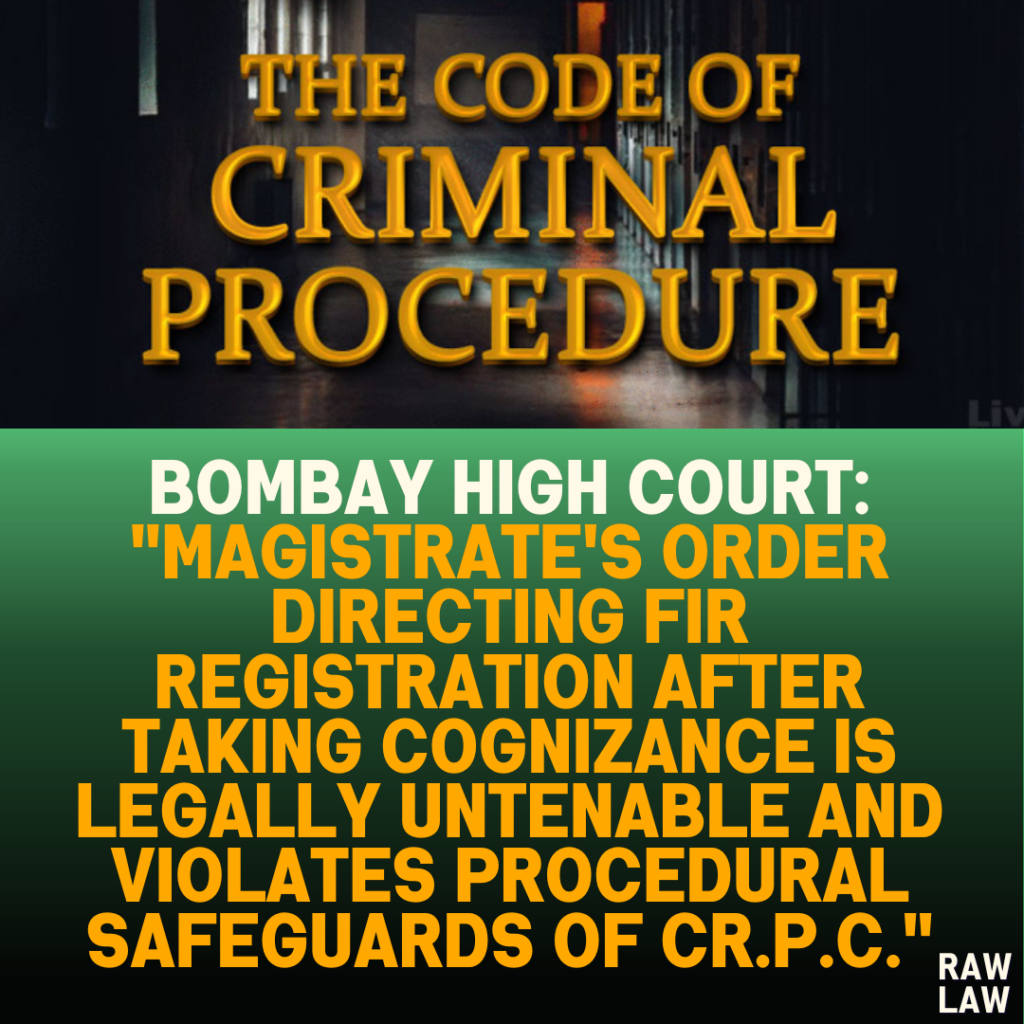Court’s Decision:
The Bombay High Court quashed the FIR registered against the petitioner for offences under various sections of the Indian Penal Code (IPC), holding that the Magistrate acted beyond his jurisdiction by directing the registration of an FIR after having already taken cognizance and directed an inquiry under Section 202 of the Criminal Procedure Code (Cr.P.C).
Facts:
The case revolves around a marital dispute where the respondent filed a complaint against the petitioner (his wife) for offences under Sections 379, 406, 409, 420, 465, 467, 497, 500, and 504 of the IPC. The Magistrate initially directed the police to conduct a preliminary inquiry and submit a report within 30 days. The police report indicated that the complaint was a counter-blast to the complaint filed by the petitioner against the respondent under Section 498-A of the IPC. Subsequently, the Magistrate directed the registration of an FIR under Section 156(3) of the Cr.P.C., which was challenged by the petitioner before the Sessions Court, and later before the High Court.
Issues:
- Whether the Magistrate could direct the registration of an FIR under Section 156(3) of the Cr.P.C. after having already taken cognizance of the complaint and directed an inquiry under Section 202.
Petitioner’s Arguments:
The petitioner argued that once the Magistrate took cognizance and directed an inquiry under Section 202, it was impermissible to revert back to the pre-cognizance stage and direct registration of an FIR under Section 156(3) of the Cr.P.C. The petitioner also contended that the order directing the registration of the FIR was passed without considering the police report, indicating non-application of mind by the Magistrate.
Respondent’s Arguments:
The respondent, represented by the State, justified the order passed by the Magistrate, contending that the FIR disclosed a cognizable offence and, therefore, the registration was legally sound.
Analysis of the Law:
The Court analyzed the scope and limitations of the Magistrate’s powers under Sections 156(3) and 202 of the Cr.P.C. Section 156(3) falls under Chapter XII of the Cr.P.C., dealing with information to the police and their powers to investigate, while Section 202 falls under Chapter XV, dealing with complaints to Magistrates. The power to direct investigation under Section 156(3) is available only at the pre-cognizance stage. Once cognizance is taken and an inquiry is directed under Section 202, the Magistrate cannot revert to the pre-cognizance stage.
Precedent Analysis:
The Court referred to several precedents, including:
- Lalita Kumari v. Government of Uttar Pradesh: The Court clarified the distinction between a preliminary inquiry by police and a judicial inquiry by a Magistrate.
- Abhinandan Jha v. Dinesh Mishra: The Supreme Court held that the Magistrate cannot switch back to the pre-cognizance stage after taking cognizance.
- Ramdev Food Products Pvt. Ltd. v. State of Gujarat: Emphasized the procedural stages under the Cr.P.C.
Court’s Reasoning:
The Court reasoned that the Magistrate’s order directing the registration of an FIR after having taken cognizance and ordered a Section 202 inquiry was legally untenable. The Magistrate failed to consider the police report, which had already indicated that no cognizable offence was made out, thereby violating the procedural safeguards laid down by the Cr.P.C.
Conclusion:
The High Court quashed the FIR dated January 2, 2023, and held that the Magistrate’s order directing its registration was without jurisdiction and contrary to the scheme of the Cr.P.C.
Implications:
The judgment underscores the importance of adhering to procedural safeguards while exercising judicial powers. It reiterates that once a Magistrate takes cognizance of a complaint and directs an inquiry under Section 202, the Magistrate cannot revert to the pre-cognizance stage to order a fresh investigation. This ruling has significant implications for the conduct of criminal proceedings, ensuring that judicial powers are exercised in accordance with the law.




Pingback: Madras High Court Slams Municipal Corporation for Repeating Arbitrary Eviction Actions; Calls 24-Hour Notice an Attempt to Circumvent Court's Previous Order and Violate Principles of Natural Justice - Raw Law
Pingback: Patna High Court Overturns Conviction for Rape and POCSO Offences Due to Lack of Credible Evidence and Failure to Prove Victim's Age - Raw Law